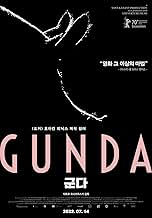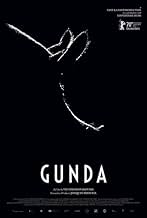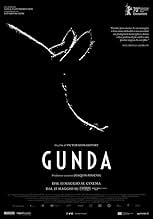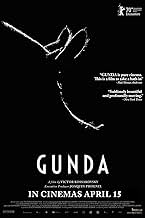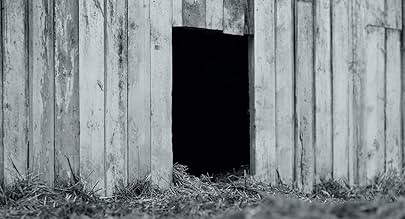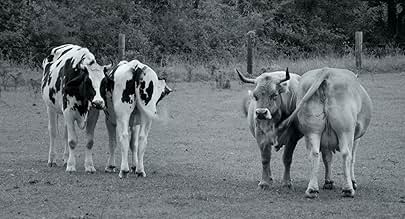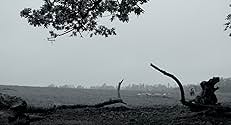IMDb-BEWERTUNG
7,1/10
3136
IHRE BEWERTUNG
Der Dokumentarfilm wirft einen Blick auf das tägliche Leben eines Schweins und seiner Nutztiergefährten: zwei Kühe und ein einbeiniges Huhn.Der Dokumentarfilm wirft einen Blick auf das tägliche Leben eines Schweins und seiner Nutztiergefährten: zwei Kühe und ein einbeiniges Huhn.Der Dokumentarfilm wirft einen Blick auf das tägliche Leben eines Schweins und seiner Nutztiergefährten: zwei Kühe und ein einbeiniges Huhn.
- Regie
- Drehbuch
- Hauptbesetzung
- Auszeichnungen
- 9 Gewinne & 32 Nominierungen insgesamt
Empfohlene Bewertungen
At first, we can't grasp what we are seeing, and it takes a while to sink in. Throughout the film, both beauty and reality will often rise up to temporarily disorient, take our breath away, and even overwhelm.
This is not your cute animal film, though it has that too. It's more akin to those moments of serenity and joy that can arise when we are watching babies move or small children explore. We feel both intimacy and otherness, and perhaps even bewilderment.
In my imagination it doesn't seem impossible that this film could be nominated for awards beyond Best Documentary. It would need its own version of Script Writing, Choreography, Directing, Editing, and Producing.
But the Cinematography! Obviously it's often spontaneous and even seat-of-the-pants. Somehow there is an endless outpouring of breath-taking photographic moments in high-resolution black and white. Will there be a picture book?
It's not that the shots are a miracle of technique; I'm sure they are. It's more how they touch such a wide range of feeling. A world is created and then ...
Like the beginning, the ending takes a while to sink in. Hushed. Eye and heart, conscience and consciousness, awakened.
This is not your cute animal film, though it has that too. It's more akin to those moments of serenity and joy that can arise when we are watching babies move or small children explore. We feel both intimacy and otherness, and perhaps even bewilderment.
In my imagination it doesn't seem impossible that this film could be nominated for awards beyond Best Documentary. It would need its own version of Script Writing, Choreography, Directing, Editing, and Producing.
But the Cinematography! Obviously it's often spontaneous and even seat-of-the-pants. Somehow there is an endless outpouring of breath-taking photographic moments in high-resolution black and white. Will there be a picture book?
It's not that the shots are a miracle of technique; I'm sure they are. It's more how they touch such a wide range of feeling. A world is created and then ...
Like the beginning, the ending takes a while to sink in. Hushed. Eye and heart, conscience and consciousness, awakened.
Looks like this film sometimes can't decide what it wants itself to be. Overall, it uses a highly poetic language with desaturated picture and "commercial" outlook with long dolly shots, wide angles and slow motion. At the same time, it always tends to be on animals' eyes level, depicting some of the unpleasant and cruel aspects of their life. However, it seems that camera is sometimes shy about what it sees, notably putting pig's back out of focus in final scene - which inevitably drives us to a conclusion that it's the human look on the animal, even if there's not a single human in frame. Surprisingly, the most coherent and touching part of three isolated novels is the one about chicken - particularly because of non-intrusive and highly tactile camera work.
Gunda stays somewhere between brutal realism of life and romantic pamphlet against cruelty to animals, mixing together two incompatible aesthetic approaches. However, a film like this had to be made, and I hope it will influence other filmmakers to experiment with storytelling from an animal point of view.
Gunda stays somewhere between brutal realism of life and romantic pamphlet against cruelty to animals, mixing together two incompatible aesthetic approaches. However, a film like this had to be made, and I hope it will influence other filmmakers to experiment with storytelling from an animal point of view.
...although more of the story of the chickens and cows life would have balanced it better.
Many informative reviews here already, hence I wanted to add some facts I looked up afterwards, also as some here got it wrong, but I won't as I don't like spoilers. You find every question which (hopefully) pops up afterwards by doing a quick search.
I'll only leave a good note I liked from AccidentalSmallHolder net ehich addresses something you'll (hopefully) also think about afterwards:
"If pig keeping isn't for you, please do the next best thing and source your pork, bacon and sausages from ethically reared pigs. If it doesn't say the pigs are born and reared outdoors, they probably weren't so don't be fooled by misleading labelling. Even pigs that are reared outdoors may have been born to sows kept indoors, in crates, so do be aware of labelling - it's more about what it doesn't say, than what it does."
Many informative reviews here already, hence I wanted to add some facts I looked up afterwards, also as some here got it wrong, but I won't as I don't like spoilers. You find every question which (hopefully) pops up afterwards by doing a quick search.
I'll only leave a good note I liked from AccidentalSmallHolder net ehich addresses something you'll (hopefully) also think about afterwards:
"If pig keeping isn't for you, please do the next best thing and source your pork, bacon and sausages from ethically reared pigs. If it doesn't say the pigs are born and reared outdoors, they probably weren't so don't be fooled by misleading labelling. Even pigs that are reared outdoors may have been born to sows kept indoors, in crates, so do be aware of labelling - it's more about what it doesn't say, than what it does."
A stunning black and white silent (save the grunting) documentary that soft focuses on the life of a pig. Seems innocuous enough, but there is magic here. Shot at ground level, and sparing nothing from farm life, "Gunda" is not here to shock, or illicit clown tears, but to have a look, like a wide-eyed child might back in the day when summers were not filled with organized sports camps or school continuation. It captures that slow, languid, breezy feel of beautiful boredom.
Opening with the birth of a litter, it follows the towering mother sow as she clumsily deals with the runt of her offspring. It is astonishing, inviting, and then shockingly cruel. What is happening is not exactly clear, and there is no deep voice over to mansplain nature. That is the beauty of this film: it evolves along with the undetermined storyline.
A slow, dreamy bit of cinema, "Gunda" works well in transporting the audience to a world most are familiar with but few actually know or have experienced hands on. The sharp monochrome delivery turns a pigsty into a pleasant aesthetic. The absence of smell helps. Nothing revelatory here, and since this is a farm, well, let's just say that the animals are not in charge, and there is a sudden dramatic turn to remind everyone about life's cold harsh realities.
"Gunda" is an animal film that is really not an animal film. It is a brilliant exercise in moment capture, shot with an addictive lens, documenting some life lessons, without preaching or dwelling on anything in particular. Pigs in showbiz are usually funny, smart or exotic. Not here. "Gunda" is a mother, and that is that.
Opening with the birth of a litter, it follows the towering mother sow as she clumsily deals with the runt of her offspring. It is astonishing, inviting, and then shockingly cruel. What is happening is not exactly clear, and there is no deep voice over to mansplain nature. That is the beauty of this film: it evolves along with the undetermined storyline.
A slow, dreamy bit of cinema, "Gunda" works well in transporting the audience to a world most are familiar with but few actually know or have experienced hands on. The sharp monochrome delivery turns a pigsty into a pleasant aesthetic. The absence of smell helps. Nothing revelatory here, and since this is a farm, well, let's just say that the animals are not in charge, and there is a sudden dramatic turn to remind everyone about life's cold harsh realities.
"Gunda" is an animal film that is really not an animal film. It is a brilliant exercise in moment capture, shot with an addictive lens, documenting some life lessons, without preaching or dwelling on anything in particular. Pigs in showbiz are usually funny, smart or exotic. Not here. "Gunda" is a mother, and that is that.
- hipCRANK.
For a subject not often given an artistic treatment, barnyard animals, Gunda is exquisitely shot. In a loving way, it shows that pigs, cows, and chickens have emotions, that they enjoy being alive, and that they have dignity. I loved it for that, and if just looking at animals go about their lives on a farm is appealing to you, this is probably your film, but otherwise, you might find its 93 minutes passing rather slowly.
There is clearly an underlying message here, but I loved how restrained the film was in getting this across. It was filmed at humane farms and sanctuaries, without narration of any kind, and that includes holding back from the customary text at the end of documentaries which fill us in on various facts and details. The viewer is left to connect the dots from the images on the screen to what was on their dinner plate most recently, or the neat cuts of packaged meat in the grocery, seen as commodities instead of living creatures. The scene where the mother pig frantically searches for her babies towards the end is distressing, but a far more damning portrayal of the cruelty of the meat industry would have been at a factory farm, and/or a slaughterhouse. In other words, this is just the tip of an enormous, immoral iceberg - and yet if taking babies away from a mother doesn't hit you in the gut, I'm not sure what will.
There is clearly an underlying message here, but I loved how restrained the film was in getting this across. It was filmed at humane farms and sanctuaries, without narration of any kind, and that includes holding back from the customary text at the end of documentaries which fill us in on various facts and details. The viewer is left to connect the dots from the images on the screen to what was on their dinner plate most recently, or the neat cuts of packaged meat in the grocery, seen as commodities instead of living creatures. The scene where the mother pig frantically searches for her babies towards the end is distressing, but a far more damning portrayal of the cruelty of the meat industry would have been at a factory farm, and/or a slaughterhouse. In other words, this is just the tip of an enormous, immoral iceberg - and yet if taking babies away from a mother doesn't hit you in the gut, I'm not sure what will.
Wusstest du schon
- WissenswertesJoaquin Phoenix and Paul Thomas Anderson were amongst the first people in the industry to publicly praise the film.
- PatzerGunda is shown wallowing in mud and the mud covers her teats. In the next sequence, her piglets suckle her teats which are suddenly clean.
Top-Auswahl
Melde dich zum Bewerten an und greife auf die Watchlist für personalisierte Empfehlungen zu.
Details
- Erscheinungsdatum
- Herkunftsländer
- Offizielle Standorte
- Sprache
- Auch bekannt als
- Gunda: Mother, Pig
- Drehorte
- Grøstad farm, Undrumsdal in Tønsberg municipality, Norwegen(the pig farm location)
- Produktionsfirmen
- Weitere beteiligte Unternehmen bei IMDbPro anzeigen
Box Office
- Bruttoertrag in den USA und Kanada
- 115.691 $
- Eröffnungswochenende in den USA und in Kanada
- 5.023 $
- 18. Apr. 2021
- Weltweiter Bruttoertrag
- 383.128 $
- Laufzeit
- 1 Std. 33 Min.(93 min)
- Farbe
- Seitenverhältnis
- 1.85 : 1
Zu dieser Seite beitragen
Bearbeitung vorschlagen oder fehlenden Inhalt hinzufügen



